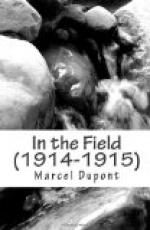September 5th.
The provisional brigade which had just been formed, with our regiment and the Chasseurs d’Afrique (African Light Cavalry), was paraded at dawn by our Colonel, who had taken command of it. The united regiments had been formed up under cover of a line of ridges, on the summit of which the watchful scouts stood out against the sky, looking north. The sun was already shining on the motley picture formed by the light uniforms of the dismounted troopers and the motionless rows of horses. They were all half asleep still.
The Colonel had drawn up the officers of the brigade in front of the squadrons. He held a paper in his hand and read it to us in a resonant voice, full of unfamiliar vibrations. On hearing the first few sentences we drew closer around him as by instinct. We could not believe our ears. It was the first time we had heard anything like it since the outbreak of the war.
When he had finished we were all amazed. Had we not been told the day before—when, together with the —— Corps, we crossed the Grand Morin closely pressed by the enemy’s advance guard—had we not been told that we were going to retire to the Seine? And now in a few noble, simple words the Commander-in-Chief told us that the trials of that hideous retreat were over, and that the day had come to take the offensive. He asked us all to do our duty to the death and promised us victory.
We returned to our squadrons in animated groups. Our delight was quickly communicated to the troops, who understood at once. The men exchanged jests and promises of fabulous exploits. They had already forgotten the fatigues of the fortnight’s retreat. What did they care if their horses could hardly carry them further, and if many of them would be incapable of galloping?
What did it matter?
My fellow-officers and I were already making wonderful plans. Those of d’A., who had just finished his course of instruction as lieutenant at Saumur with honours, comprised vast movements of complicated strategy. They culminated in a prodigious but inevitable envelopment of the German armies, De F., more prosaic than the other, dreamt of Pantagruelian repasts liberally furnished with Rhine wines. O., a sub-lieutenant, just fresh from the Military College—which he had left with a No. 1, mind you—seemed like a young colt broken loose; his delight knew no bounds. As for our captain, Captain de la N., our kind and sympathetic chief, he was transfigured. The horrors of the retreat had affected him painfully, but the few lines that had been read to us had sufficed to restore all his joyous ardour.
“Captain, the Colonel wants an officer.”
“Hurrah!” It was my turn for duty.... Just a few words of congratulation, some hands stretched out to me, and I went, leaving a general feeling of envy behind me. Here was I in the presence of the Colonel, who, with a map in his hand and surrounded by the superior officers, explained in a few short sentences what he required of me.




